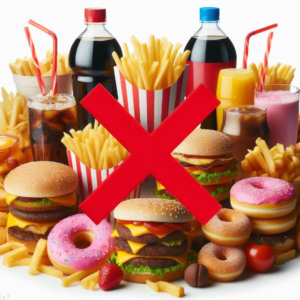Identify the Foods That Disrupt Sleep Quality and Trigger Insomnia
A variety of foods can significantly interfere with your sleep patterns, making it increasingly difficult to attain the restorative rest essential for your wellbeing. So, which specific foods are widely recognised for negatively impacting sleep quality? In this comprehensive article, we will delve into some of the most problematic dietary choices that lead to insomnia and various sleep-related challenges.
Enduring insomnia entails not only the struggle to fall asleep but also the difficulty of sustaining sleep throughout the night. The repercussions of inadequate sleep can leave you feeling exhausted during the day, severely hampering your ability to concentrate. This lack of quality rest can adversely affect your mood, resilience, and overall immunity. Ultimately, this can pave the way for numerous health complications and illnesses. While various factors contribute to insomnia, your diet stands out as a considerable element of this complex puzzle.
Examine How Caffeinated Beverages Impact Your Sleep Quality
Caffeine, a naturally occurring psychoactive compound found in widely consumed items such as coffee, tea, and an assortment of energy drinks, can profoundly affect your ability to both fall asleep and remain asleep. As a notorious stimulant, caffeine complicates the initial stages of falling asleep and disrupts your sleep cycle by causing multiple awakenings throughout the night. Additionally, caffeine acts as a diuretic, leading to frequent trips to the restroom during the night, which further interrupts your sleep. Given that caffeine can take several hours to metabolise and exit your system, it is advisable to refrain from consuming it after midday for a more restful night. 
Investigate the Connection Between Caffeine Consumption and Anxiety Levels
Another crucial aspect to consider is the relationship between caffeine intake and anxiety. Caffeine stimulates the central nervous system, and while many individuals may enjoy a brief surge of energy following caffeine consumption, others may experience feelings of restlessness and jitters. This heightened state of anxiety can exacerbate the symptoms of insomnia. Research indicates that individuals with chronic anxiety frequently report insomnia symptoms, which include difficulties both in falling asleep and remaining asleep throughout the night. This creates a detrimental cycle of caffeine-induced anxiety that worsens persistent sleep deprivation.
For those grappling with anxiety, it is vital to closely monitor caffeine consumption to mitigate additional sleep disturbances. Notably, studies have shown that women generally consume slightly less coffee than men but may experience a more substantial increase in blood pressure due to caffeine intake. The correlation between elevated blood pressure and insomnia provides a compelling reason to remove caffeine from your diet.
Identify Caffeinated Foods That May Disrupt Sleep
You may be surprised to learn that various foods also contain caffeine. Items like those that include cocoa or chocolate (particularly dark chocolate) contain caffeine due to the presence of the compound theobromine. Furthermore, many common over-the-counter pain medications incorporate caffeine as a key ingredient. For those facing insomnia, it is advisable to take such medications prior to midday and choose caffeine-free alternatives later in the day. While moderate caffeine consumption has been linked to several health benefits, it is essential to be mindful of your overall daily intake to avoid adverse effects such as heightened anxiety and disrupted sleep. Consider replacing that late-night cup of cocoa with a soothing malted milk drink instead.
Another intriguing factor is the potential influence of genetics on individual reactions to caffeine. Variations in specific genes can greatly affect how even small amounts of caffeine can impact your sleep quality.
Your genetic predisposition to caffeine sensitivity is a critical consideration that should not be overlooked. If you find it challenging to achieve restorative sleep after consuming even a minimal amount of caffeine, it may be advantageous to explore whether you possess a genetic trait influencing your response to this stimulant.
Moreover, if you are dealing with insomnia, you may be tempted to consume coffee or energy drinks during the day to remain alert and focused. Unfortunately, this tactic can backfire, further disrupting your nighttime sleep quality.
For those experiencing insomnia, it is recommended to completely avoid caffeine during the evening hours or potentially eliminate it entirely from your diet.
Explore the Effects of Spicy Foods on Sleep Quality
While there is no direct association between spicy foods and insomnia, these types of foods can inadvertently contribute to sleep disturbances. This occurs because they may provoke heartburn and indigestion, which are both frequently linked to difficulties in falling asleep.
If you are already afflicted with heartburn or indigestion, lying down can exacerbate these issues. When you recline, stomach acid can flow back into the throat, resulting in discomfort and pain as it irritates the sensitive lining of the oesophagus. Interestingly, consuming spicy foods, especially those seasoned with ginger, chilli, or pepper, can elevate your body temperature. Proper sleep hygiene suggests that cooler temperatures are more conducive to quality sleep, making any food that raises your body temperature a poor choice for individuals suffering from insomnia.
Investigate the Potential for Spicy Foods to Induce Nightmares
Anecdotal evidence suggests that consuming spicy foods may impact sleep quality, potentially leading to nightmares and bizarre dreams. Although scientific research has yet to establish this connection, there is evidence indicating that elevated body temperatures, akin to those experienced during a fever, can result in unsettling dreams. While this connection is tenuous, it may hold some truth. If you enjoy spicy cuisine but find yourself plagued by disturbing dreams, it might be prudent to reconsider your evening meal choices!
Taking into account all the points discussed, if you are struggling with insomnia, it may be wise to avoid consuming spicy foods within three hours of your bedtime.
Assess the Impact of High-Fat Foods on Sleep Quality
Imagine this scenario: you've had a fantastic night out, the bars are closing, and you choose to indulge in some tasty chips or perhaps a greasy kebab. While such a meal may be enticing, especially after a few drinks, consuming a meal rich in fat close to bedtime is not advisable. Similar to spicy foods, meals high in fats, particularly saturated fats, can hinder your ability to achieve restorative sleep.
As you prepare for bed, your digestive system instinctively slows down. Your body is designed to digest food during daylight hours rather than while you sleep. Consequently, the absence of digestive enzymes and the sluggish nature of digestion at night can lead to discomfort. This discomfort is exacerbated by lying down since gravity does not aid in moving food through your digestive system. Thus, eating high-fat foods shortly before bedtime can result in restlessness or awakenings due to stomach discomfort.
Moreover, the time it takes for you to fall asleep, the overall quality of your sleep, and the restorative benefits derived from sleep can all be negatively affected by consuming fatty foods close to bedtime. This effect can be even more pronounced in women!
A study has indicated that the metabolism of fatty foods may inhibit the release of melatonin, the essential sleep hormone. This complex biological process involves the enzyme P-elF2α operating within cells.
The essential takeaway here is that if you are experiencing insomnia, it is best to avoid high-fat foods near bedtime and ideally eliminate them entirely from your evening meals.
Understand the Detrimental Effects of Sugar on Sleep Quality
Throughout the night, it is customary for individuals to refrain from eating, granting the digestive system time to rest and rejuvenate. During this period, enzymes and hormones used for digestion during the day are dismantled, effectively resetting your gut for the upcoming day.
Investigate Why Sugary Foods Should Be Excluded from Evening Meals
For most individuals, the body maintains sufficient energy reserves in the form of fat, enabling it to sustain itself for several hours without food. However, consuming a high-sugar or high-glycemic meal in the evening can initiate a sudden energy surge, leaving you feeling overly stimulated or ‘wired.’
The rapid influx of sugar into the bloodstream, followed by a quick crash, can provoke feelings of hunger. This can complicate the process of falling asleep, as going to bed hungry is particularly undesirable, especially for those battling insomnia. The desire to consume something else can exacerbate the problem of undigested food lingering in the gut at bedtime, resulting in further indigestion and heartburn, akin to the effects of fatty foods.
Many individuals enjoy a soothing warm milky drink before sleep. If this is part of your nightly routine, it is prudent to avoid adding sugar, as it has been associated with negatively impacting the duration of your sleep.
Consuming sugary foods before bedtime may lead to restless sleep and unpleasant dreams. If you desire sweet dreams, it is advisable to avoid sugar in the hours leading up to sleep.
If you find it challenging to sleep, it may not have occurred to you that your dietary choices can significantly affect your sleep quality. While various foods can contribute to insomnia, caffeine, fats, sugars, and spices are the primary culprits. With this enhanced understanding of the foods that influence your sleep, you can take proactive measures to tackle your struggles with insomnia.
For additional insights on improving sleep quality, you may find this article beneficial.
References
The Link Between Caffeine and Insomnia
How Processed Carbs Impact Your Sleep
The Relationship Between Food and Sleep Disturbances
The Article: Is Food Sabotaging Your Sleep? Change Your Diet to Improve Sleep appeared first on https://janestevensnutrition.com
The Article: Food Sabotaging Your Sleep? Revamp Your Diet for Better Rest appeared first on https://janestevens.net
The Article Revamp Your Diet for Better Sleep Quality Was Found On https://limitsofstrategy.com

